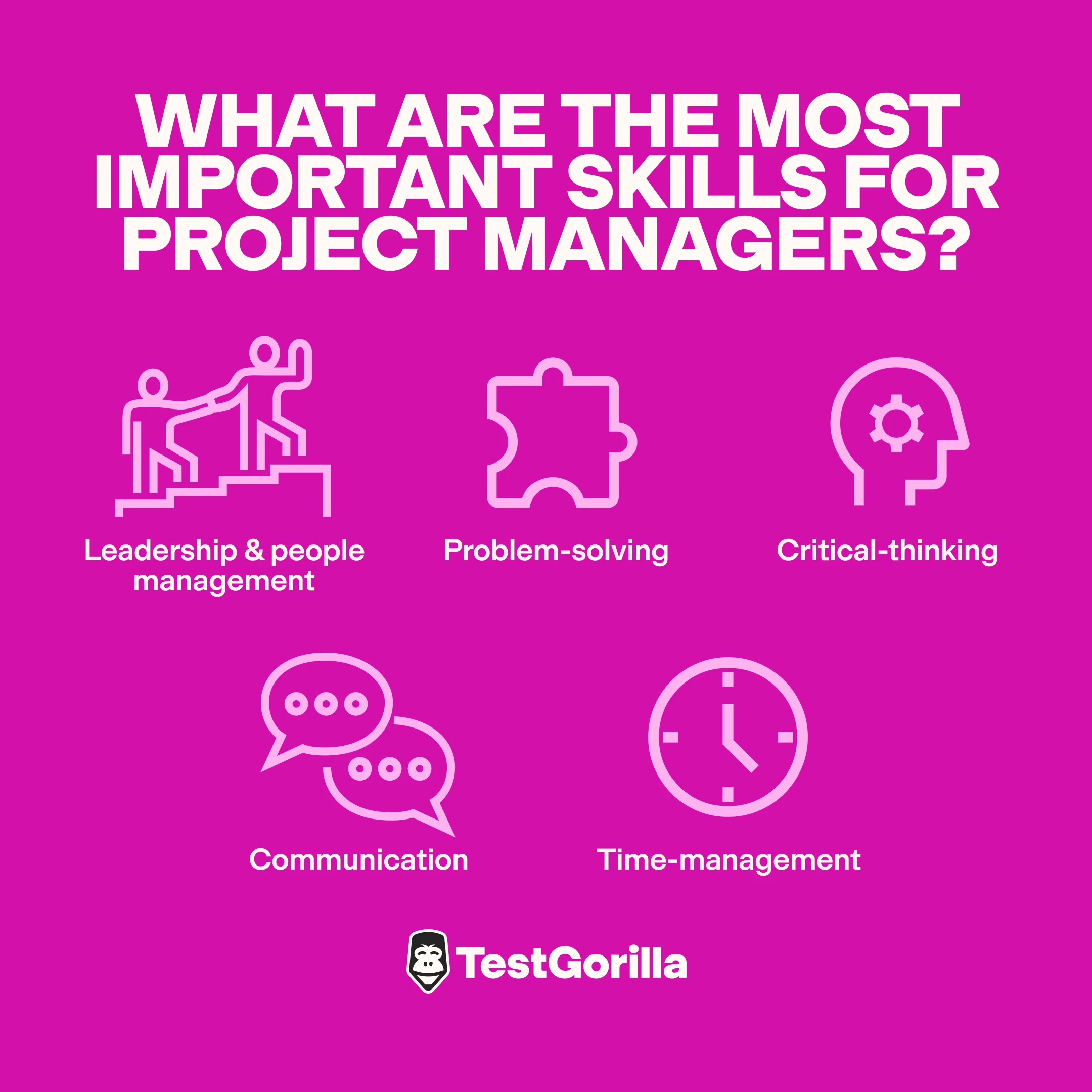69 project manager interview questions to ask top candidates
Does your team need a confident and skilled project manager to lead and manage complex tasks? Are you struggling to find the best methods to review your applicants? The two most straightforward approaches include using a skills test and interviewing candidates with a pre-set list of questions.
Head to our test library for the best Project Management skills test to assess your candidates. You can use the test directly after sourcing applicants, which will help you figure out who to invite to an interview.
Then, you can use some of the 69 project manager interview questions below to gain a deeper understanding of your applicants’ skills.
Create your list with the help of our questions and interview candidates effortlessly.
Table of contents
- 25 general project manager questions to ask applicants
- 7 general project manager interview questions and answers
- 23 project manager questions about definitions
- 7 project manager interview questions and answers related to definitions
- 21 situational project manager questions to ask candidates
- 7 situational project manager interview questions and answers
- What are the most important skills for project managers and how can you assess them?
- What are the advantages of using skills tests before interviewing project managers?
- Hire the best project manager to help your team succeed
25 general project manager questions to ask applicants
Here are 25 general project manager interview questions with which you can start the interview. These will enable you to evaluate whether your applicants have the right foundational knowledge and project management abilities to match your requirements.
What is your definition of a perfect project?
Would you consider yourself prepared for remote team management?
Which skills are essential for project managers?
Which skills do you need to improve as a project manager?
Describe the most challenging projects you’ve been in charge of.
Name the biggest mistake of your recent project management career.
Describe a project that failed. How did you handle it, and what did you learn?
Explain what you understand by team forming.
Describe your leadership style.
Describe your communication style.
Explain how you offer feedback to your team.
Explain how you would manage team performance.
Explain how you motivate individuals within a team.
Explain how you delegate effectively.
Name three short-term career goals you hope to achieve as a project manager.
How do you know who a stakeholder is in your business?
Explain why maintaining a traceability matrix is essential.
Describe the most successful project your team has completed.
Which skills are essential for implementing an escalation path?
Describe your most recent project.
Why are leadership skills necessary for project managers?
Why is time management important for project managers?
Which approach would you use to start a new project management job on the right foot?
Explain why being proactive is vital for project managers.
Name six risks you may encounter in a project.
7 general project manager interview questions and answers
Below, we’ve provided answers to the top seven questions from the previous section. Use the sample responses to review your candidates’ general project management experience and knowledge.
1. Would you consider yourself prepared for remote team management?
When answering this project management interview question, applicants may cite specific problems they are prepared to handle when managing remote teams.
Can your candidates help team members overcome isolation and distractions, and deal with the lack of in-person supervision? Can they set up regular meetings, encourage social interactions, support remote team members who may experience stress, and be empathetic?
2. Which approach would you use to start a new project management job on the right foot?
There are several critical approaches your applicants may use to begin a new project management job successfully.
The first step your applicant may mention is to learn the role’s demands. They must also understand their client’s requirements and their team members’ abilities. Your candidates must also know how to take the initiative and develop new skills on the job.
3. Why are leadership skills important for project managers?
Leadership skills are critical for project managers, but can your applicants explain why? Do they know that being able to motivate and inspire team members are two fundamental leadership subskills that can encourage a team to meet its targets?
When responding to this project manager interview question, candidates may also discuss their leadership style. For instance, a project manager may favor a coaching style over a democratic leadership style or vice-versa.
Assess your applicants’ leadership skills with a Leadership and People Management test.
4. Why is time management important for project managers?
Precise time estimates require exceptional time management skills.
If the next project manager you hire has the right time management skills, they should be able to avoid delays during project completion. They should understand that time management skills can help teams prevent schedule overruns.
Consider our Time Management skills test if you need to review your applicants’ time management skills.
5. Which skills do you need to improve as a project manager?
Not every applicant will have every skill you need them to have. As long as they’re working to improve their essential project management skills, that’s okay.
For example, let’s suppose your applicant lacks remote team management expertise. In that case, they may seek additional training when they join your organization or even look for ways to gain some experience at their current position, before they change jobs.
6. Explain how you motivate individuals within a team.
From offering praise to career advice, your applicants should have their methods to motivate others. In coordination with team leads, project managers may also offer bonuses to employees who have achieved exceptional results.
Whichever method they have used in the past, consider the outcome on team members’ motivation and ask applicants whether the team’s performance was positively impacted.
7. How do you know who a stakeholder is in your business?
Skilled project managers should know who the stakeholders in a business are and how to identify them from the start.
There are several methods a candidate may mention. For instance, your candidate may assess whether a person supplies resources, supports the team, provides guidelines, or allocates funds to learn whether they are a stakeholder in the business.
The best insights on HR and recruitment, delivered to your inbox.
Biweekly updates. No spam. Unsubscribe any time.
23 project manager questions about definitions
There are 23 project manager interview questions about definitions in this section. Ask your applicants some of these questions to gauge their technical project management knowledge.
Explain what risk is in a project.
Explain what an issue is in a project.
Explain what RAID means in project management.
Define gold plating in project management.
Explain what monitoring a project involves.
Explain what controlling refers to in project management.
Explain the difference between monitoring and controlling a project.
Define EVM in project management.
Define stakeholder analysis.
Define and explain what a power-interest grid is.
Explain what a fishbone diagram is.
Explain what work breakdown structure refers to.
Define the Pareto principle.
Explain what a traceability matrix is.
Explain what a project is.
Explain what a program means.
Explain what portfolio means.
Define risk impact.
Define risk probability.
Explain what the triple constraint triangle refers to.
Explain what budget management refers to.
What is fast-tracking?
What is crashing?
7 project manager interview questions and answers related to definitions
Below, you’ll find the answers to seven of the project manager interview questions about definitions. Use them to determine whether your candidates are a good match to the position.
1. Explain the difference between monitoring and controlling a project.
Even though they both enable project managers to ensure projects run smoothly, there is one critical difference between monitoring and controlling a project. While monitoring a project involves pinpointing the inconsistencies between the baseline and the results of a project, controlling involves highlighting the options to repair project deviations.
2. Name five items you always include in your project plan.
Skilled project managers should understand that several actions can make project planning easier, such as to:
Evaluate the project’s requirements
Consider the scope and budget
Estimate costs
Focus on the schedule
Monitor the project
3. Explain what controlling refers to in project management.
Controlling is an important aspect of project management, and your applicants should be able to outline what it means. Can they explain that finding and suggesting options to correct any deviations from the project is a critical aspect of controlling that enables the project to run efficiently?
4. Explain what work breakdown structure refers to.
Do your applicants understand that the work breakdown structure (also known as a WBD) enables project managers to identify the critical elements that make up a project? Are they aware that the WBD also refers to the outline of the sub-activities that contribute to the project?
Capable project managers should also know that a WBD uses a hierarchical structure and that sub-activities are placed underneath the core activities.
5. Explain what RAID means in project management.
Candidates should know that RAID refers to the risks, actions, issues, and decisions that make up a project. Knowledgeable project managers will also know that a RAID log helps project organizers to track and monitor the risks and issues and make decisions for projects in an efficient way. Check whether your candidates can define the four parts of the RAID acronym and if they have used this concept to manage projects.
6. Explain what a power-interest grid is.
Can your interviewees explain that a power-interest grid is an excellent method to classify and distinguish stakeholders? As a project manager plots the stakeholder on the grid, it’s easy to find their respective power position in the business. Applicants should know that power-interest grids use different categories, helping project managers to identify each stakeholder’s role and relevance to the project.
7. Explain what the triple constraint triangle refers to.
Since the triple constraint triangle is critical in helping project managers handle restrictions in a project, look for candidates who understand what it refers to. Applicants should be able to highlight the three essential aspects of the triple constraint triangle, which are time, money, and scope. Check whether your candidates understand why each triple constraint is necessary for project planning and completion.
21 situational project manager questions to ask candidates
Here are 21 situational project manager interview questions you can ask your candidates to determine how they respond to challenging situations.
Which method would you use to implement EVM for a project?
Which techniques would you use to explain a project’s scope?
How would you prioritize tasks efficiently?
You notice that a project is not progressing as planned. How do you rectify this?
You notice that two team members have clashed. How do you handle this?
In which situation would you choose to escalate an issue?
Which is your favorite project management software?
Name four motivational theories that you could use to keep your team inspired.
A team member finds it difficult to arrange face-to-face meetings. How do you handle this challenge?
Which method would you use to review the responsibilities you have delegated?
Which method would you use to set team goals?
Your project’s scope is changing. How do you handle this?
Which time management method would you use to complete projects on time?
How do you remain proactive when making decisions?
Name five steps you would take to manage project risk.
Which method would you use to handle the execution of a project?
Which approach would you use to address the underperformance of a team member?
Which approach would you use to handle a challenging stakeholder?
Have you ever had to tackle scope creep? Which method did you use?
Which method would you use if your clients were dissatisfied with your team’s work?
How do you earn your team’s trust as a project manager?
7 situational project manager interview questions and answers
Use the answers to these seven situational project manager interview questions to assess your applicants’ responses and see whether they have what it takes to succeed in your company.
1. Which method would you use to implement EVM for a project?
Not only should applicants know what EVM refers to, but they should also know how to implement it effectively. Do your candidates know that EVM is short for earned value management? Are they aware that this method helps project managers determine if there are any discrepancies in the project?
Skilled applicants should understand that a project schedule is one of the most straightforward methods to use EVM. A project manager’s schedule should list every activity, the beginning and end date, and the budget.
2. Which approach would you use to address the underperformance of a team member?
Project managers can take several essential steps to handle the underperformance of a team member. Can your applicants name them?
Some of the key ways to address a team member’s insufficient performance include to:
Have an informal chat with them
Get to the root cause of the poor performance
Offer the right support and advice
Suggest a change of roles or tasks
Assist the team member in adjusting to the role
3. Which approach would you use to handle a challenging stakeholder?
Several steps can help project managers handle challenging stakeholders. Do your candidates know which approaches they can use to achieve this?
Some of the main approaches they can use are to:
Understand the requirements of the stakeholder
Meet with the stakeholder regularly
Learn the factors that drive or motivate them
Share their point of view and discuss approaches
Sharing their team’s point of view
4. Name five steps you would take to manage project risk.
Risk planning is critical for project managers. The process can minimize project issues and increase the chances of success.
Can your candidates explain the five critical steps required to manage risk successfully? These are to:
Discover the main risks
Analyze the risks and other potential challenges
Prioritize the order in which the team should handle each risk
Create a risk response
Monitor the risks
5. What is your favorite project management tool?
Several software tools are available to help project managers in their work. Look for signs that your applicant has used different project management software tools in recent projects. For example, applicants may mention that they have used ProjectManager’s Gantt charts or the Gantt charts in GanttPro. Look for candidates who know the advantages and disadvantages of different tools and are able to explain the reasoning behind their choice.
6. How would you prioritize tasks efficiently?
Since task prioritization is critical, listen for signs that your candidates can handle it successfully to meet deadlines.
When explaining how they prioritize tasks efficiently, applicants may mention a few methods, including the following:
List every task and responsibility required
Distinguish between urgent and less-urgent tasks
Weigh up how important each task is
Put the tasks in order depending on their importance
Be prepared to switch priority if new tasks are more urgent
7. Name four motivational theories that you could use to keep your team inspired.
Does your applicant understand which motivational theories are essential to help drive their teams to success? Candidates may mention the following examples when responding to this interview question:
Maslow’s motivation theory
Vroom’s expectancy theory
Herzberg’s two-factor theory
McClelland’s human motivation theory
What are the most important skills for project managers and how can you assess them?
Project managers’ most important skills include leadership, problem-solving, critical thinking, communication, and time management, among others.
The fastest and most efficient method to assess these vital skills is to use a skills assessment. If you use TestGorilla, you can combine up to five tests in a single assessment to get a precise idea of your applicants’ strengths.
Here are some of the tests you may consider:
1. Leadership and People Management test
Review your applicants’ leadership and management skills, including planning, support, guidance, feedback, and delegation, by using our Leadership and People Management test. You’ll also find out which applicants are eager to lead and can align the team members’ abilities with the targets of your organization.
2. Problem-solving test
Assess your applicants’ ability to find the right solutions to problems using our Problem-solving test. Find out whether applicants can create schedules, analyze information to solve complex problems, and apply logic to implement decisions.
3. Critical-thinking test
When hiring for a project management role, you need to assess whether applicants are able to use their analytical skills to assess a situation and judge it correctly. Learn whether your next project manager can use deductive reasoning, observe relationships between cause and effect, and evaluate information effectively when managing projects and teams with a Critical-thinking test.
4. Communication test
Use our Communication skills test to determine whether your next project manager has the right communication skills to interact with their team and stakeholders easily.
With our test, you can learn if your applicants can handle the responsibilities of the job: Are they able to provide clear information about a project’s next steps, use active listening, and understand written communication?
5. Time-management test
From prioritization to planning, there are several skills you can review with our Time-management test. Find out whether your candidates have the right time management skills to lead projects to completion within a specific timeframe.
Recommended reading: 10 qualities of a top project manager you should know
What are the advantages of using skills tests before interviewing project managers?
There are several advantages of testing applicants’ skills before interviewing them.
Not only does this method help you avoid unconscious bias, but it also ensures you pick the best candidates for your organization, projects, and team based on their actual performance and test results rather than on information in their CVs.
Plus, you can evaluate several skills at the same time, which gives you a full overview of your applicants’ abilities. Learn more about whether you should include Excel competency tests in your project manager hiring campaign. At the bottom of your hiring funnel, you’ll have no problem choosing between two candidates who perform equally well during the interview phase: Simply check their test scores to see who is better.
Hiring a program coordinator instead? Check out our guide on writing a program coordinator job description to start your search.
Hire the best project manager to help your team succeed
Even though a skilled project manager can be difficult to find, with some preparation and the right hiring tools, you can make the process much simpler. Use skills testing and the right project manager interview questions and you’ll be sure to hire the perfect match.
When you use skills tests such as the Project-management test, remember to always administer them at the first opportunity you get, i.e. immediately after candidates apply for your open position.
This way, you can quickly eliminate unskilled applicants and only spend time with the best of the bunch. Plus, you’ll be able to limit bias and speed up hiring.
Use TestGorilla’s assessments and the interview questions in this article to assess your applicants and hire the best project manager for your organization.
You've scrolled this far
Why not try TestGorilla for free, and see what happens when you put skills first.


















